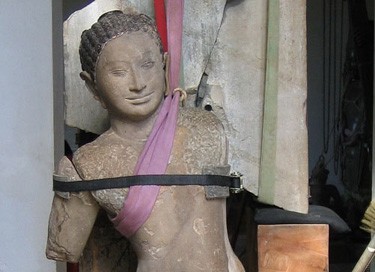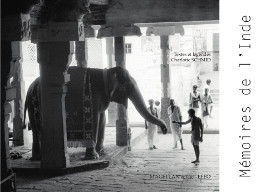History

The Indochina Years
The École française d'Extrême-Orient (EFEO), or French School of Asian Studies, was founded in 1898 in Saigon as the Mission archéologique d'Indo-Chine. The institution was created on the joint initiative of the Oriental Studies section in the French Academy of Inscriptions and Belles-Lettres and the colonial government of what was then French Indochina, the former envisaging scholars working onsite in Asia - along patterns already established by the French institutes in Athens, Rome, and Cairo - whereas the latter aimed to establish an authority that would be responsible for the inventory and preservation of the cultural heritage of Indochina.
In 1900 the Mission archéologique was renamed École française d'Extrême-Orient, and in 1902 the School headquarters were removed to Hanoi, with its main missions defined as archaeological exploration, collection of manuscripts, preservation of monuments, inventorying of ethnic groups, linguistic studies, and the study of the history of all Asian civilizations from India to Japan. To this end an ambitious academic programme, a library and a museum - which has since become the Vietnamese National Historical Museum - were put in place at the headquarters. Other museums followed: at Da Nang, Saigon, Hue, Phnom Penh, Battambang, and elsewhere. In 1907 the EFEO was assigned responsibility for the conservation of the Angkor archaeological site. This early phase of EFEO's work is still renowned for the contributions of many distinguished Orientalists: Paul Pelliot, Henri Maspero, and Paul Demiéville in Chinese studies; Louis Finot and George Cœdès in Indochinese epigraphy; Henri Parmentier in archaeology, Paul Mus in the history of religion, among many others.
The School's development after 1945
After 1945 a new period opened for the EFEO. Despite the war, and thanks to a real desire for scholarly cooperation with the newly independent states in the area, its members continued their work in continental Southeast Asia: ethnology, Buddhist studies, studies of language, literature, and above all archaeology, with huge reconstruction sites among the monuments of Angkor using the newly developed method of anastylosis. In 1957 the School was obliged to leave Hanoi, and finally, in 1975, Phnom Penh. During this troubled period the EFEO dedicated itself to widening its range of activities and developing new scholarly collaborations. In India, a permanent center was opened in Pondicherry in 1955 to carry out studies in Shivaite literature and the history of the art of the southern part of the subcontinent; later a branch of this center was opened in Pune. During the late 1950's a center was established in Jakarta for archaeologists and specialists in religious epigraphy. In Japan in 1968 the Hobogirin Institute in Kyoto brought together specialists in Chinese and Japanese Buddhism, and, a few years later, a center was established in Chiang Mai for the study of the Buddhism of Southeast Asia. Distinguished scholars from this period include, among others, Jean Filliozat in Indian studies, Rolf A. Stein in Chinese and Tibetan studies, Bernard Philippe Groslier in the archaeology of Angkor, Charles Archaimbault in Laotian ethnology, and Maurice Durand in Vietnamese studies.
The EFEO in the 21st century
The end of the war and return to a degree of stability in Southeast Asia allowed the EFEO to reestablish itself in the region, in response to requests by several local academic and political authorities. The Ecole first returned to Cambodia in 1990, after the restitution of its former real estate in Siem Reap and the revival of archaeological and conservation work at Angkor. Three years later came the opening of a new Centre in Vientiane, followed by Hanoi where the EFEO acquired a new building and library and engaged once again in research and publication in the fields of history, anthropology and epipraphy. This return to the institution's roots did not slow the opening of new horizons, both geographical and thematic: new Centres were opened in partneship with local institutions in Kuala Lumpur (National Museum), Hong Kong (Chinese University of Hong Kong), Taipei (Academia Sinica), Tokyo (Toyo Bunko), Seoul (University of Korea), and finally Beijing (Chinese Academy of Sciences); in terms of research priorities, the period saw a marked opening to the Social Sciences and contemporary Asia: study of Indian commercial networks, the modern and contemporary demography of highland continental Southeast Asia, ehtnic conflict and issues of national and regional integration of minorities, the dynamics of religion in the contemporary societies of China, Thailand and Indonesia, the politics of national heritage conservation. At the beginning of the 21st century the EFEO participates actively in the digital transformation of humanities research and the growing internationalisation of Asian studies, and occupies a central position in the network of high-level academic partnerships in Asia and Europe developed since 2007 under the European Consortium for Asian Field Study initiative (ECAF).
This exhibition includes photos of Angkor, but also of Phimai, Phanom Rung and Phanom Wan, highlighting the long-standing cooperation between the EFEO and Thai archaeologists, first and foremost Prince Damrong, whose full-length photo welcomes visitors to the main hall.
The Émile Sénart Prize 2021 of the Académie des Inscriptions et Belles-Lettres was awarded to Ramyatna Shukla for the body of research devoted to vyākaraṇa, an Indian technique of grammatical description and philosophy of speech, exegesis and logic.
Read READ MORE

D'un empire, l'autre
Premières rencontres entre la France et le Japon au XIXe siècle, François Lachaud & Martin Nogueira Ramos (éd.), Études thématiques 33, Paris, EFEO, 2021, 402 pages.
READ MORE
This online event, hosted by the French ambassador, will gather representatives from the Cambodian government, APSARA National Authority, UNESCO, International Coordinating Committee for the Safeguarding and Development of the Angkor Region (CIC-Angkor), the EFEO as well as other actors involved in heritage conservation and development in Cambodia.
🗓️ Tuesday, October 26 from 2:30pm to 4:30pm (Cambodian time, 9:30am to 11:30am French time)
To join the event ➡️ fb.me/e/2CdlgSkX0
The entire staff of the EFEO will always remember him with the greatest respect and we express our deepest condolences to his family.
In Memoriam by Franciscus Verellen
Meet the Réseau des Écoles françaises à l'Étranger - ResEFE - at the 24th Rendez-vous de l'histoire in Blois during the Carte blanche for the ResEFE: "Les chercheurs sur leur terrain de travail : questions sociales et environnementales". October 8, 2 to 3:30 p.m. Chocolaterie site of the IUT - Amphi 1, Blois.
Christophe Pottier, for the EFEO, will present "Vivre et travailler dans les temples d'Angkor au XXe siècle".
The ResEFE will also be present at the Salon du livre, on the stand of the Librairie Jean de Léry (Stand N and N')
Programme and information
Registration to follow the event online





